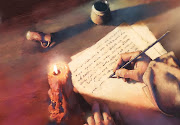John Newton (1725-1807)
Amazing grace, how sweet the sound
That sav’d a wretch like me!
I once was lost, but now am found,
Was blind, but now I see.
’Twas grace that taught my heart to fear,
And grace my fears reliev’d;
How precious did that grace appear,
The hour I first believ’d!
Thro’ many dangers, toils and snares,
I have already come;
’Tis grace has brought me safe thus far,
And grace will lead me home.
The Lord has promis’d good to me,
His word my hope secures;
He will my shield and portion be,
As long as life endures.
Yes, when this flesh and heart shall fail,
And mortal life shall cease;
I shall possess, within the veil,
A life of joy and peace.
The earth shall soon dissolve like snow,
The sun forbear to shine;
But God, who call’d me here below,
Will be forever mine.
John Newton, Olney Hymns (London: W. Oliver, 1779)
"Amazing Grace" is a well-known Christian hymn by Englishman
John Newton and which first appeared in print in Newton's Olney Hymns (
1779).
John Newton, the author of the lyrics to Amazing Grace, was born in 1725 in Wapping, England.[1] Despite the powerful message of "Amazing Grace," Newton's religious beliefs initially lacked conviction; his youth was marked by religious confusion and a lack of moral self-control and discipline.[1]
After a brief time in the Royal Navy, Newton began his career in slave trading. The turning point in Newton's spiritual life was a violent storm that occurred one night while at sea. Moments after he left the deck, the crewman who had taken his place was swept overboard. Although he manned the vessel for the remainder of the tempest, he later commented that, throughout the tumult, he realized his helplessness and concluded that only the grace of God could save him. Prodded by what he had read in Thomas à Kempis' Imitation of Christ, Newton took the first step toward accepting faith.[1]
These incidents and his 1750 marriage to Mary Cartlett changed Newton significantly. On his slave voyages, he encouraged the sailors under his charge to pray. He also began to ensure that every member of his crew treated their human cargo with gentleness and concern. Nevertheless, it would be another 40 years until Newton openly challenged the trafficking of slaves.[1]
Some three years after his marriage, Newton suffered a stroke that prevented him from returning to sea; in time, he interpreted this as another step in his spiritual voyage. He assumed a post in the Customs Office in the port of Liverpool and began to explore Christianity more fully. As Newton attempted to experience all the various expressions of Christianity, it became clear that he was being called to the ministry. Since Newton lacked a university degree, he could not be ordained through normal channels. However, the landlord of the parish at Olney was so impressed with the letters Newton had written about his conversion that he offered the church to Newton; he was ordained in June 1764.[1]
In Olney, the new curate met the poet William Cowper, also a newly-born Christian. Their friendship led to a spiritual collaboration that completed the inspiration for "Amazing Grace," the poem Newton most likely wrote in Kineton, Warwickshire[citation needed] around Christmas 1772.[1] The lyrics are based on his reflections on an Old Testament text he was preparing to preach on, adding his perspective about his own conversion while on his slave ship, the Greyhound, in 1748.
Newton's lyrics have become a favorite for Christians, largely because the hymn vividly and briefly sums up the doctrine of divine grace. The lyrics are based on 1 Chronicles 17:16-17, a prayer of King David in which he marvels at God's choosing him and his house. Newton apparently wrote this for use in a sermon he preached on this passage on New Year's Day 1773, and for which he left his sermon notes, which correspond to the flow of the lyrics[2]. (He entitled the piece "Faith's review and expectation.")
The song has also become known as a favorite with supporters of freedom and human rights, both Christian and non-Christian, in part because many assume it to be Newton's testimony about his slave trading past.
The hymn was quite popular on both sides in the American Civil War.
The association with
bagpipes is relatively modern; for over a century, the tune was nearly forgotten in the British Isles until the folk revival of the 1960s began carrying traditional musicians back and forth between the British Isles and the United States (where "Amazing Grace" had remained a very popular hymn). It was little known outside church congregations or folk festivals until Arthur Penn's film Alice's Restaurant (1969), in which Lee Hays of The Weavers leads worshipers in singing "Amazing Grace."
Sursa: Wikipedia





































